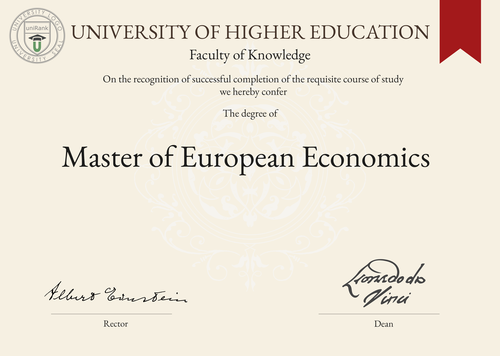
Master of European Economics (MEE)
Guide to Master of European Economics Program/Course/Degree
Master of European Economics (MEE)

Program Name:
Master of European EconomicsProgram or Degree abbreviation:
MEEDuration range:
1-2 yearsTuition range:
Varies by country and universityOverview:
The Master of European Economics program provides students with a comprehensive understanding of the European economy, its policies and its integration process. It equips students with the necessary skills and knowledge to analyze economic issues specific to Europe and prepares them for careers in various sectors related to European economics.Curriculum Overview by year:
The curriculum is designed to cover a wide range of topics related to European economics. In the first year, students typically study core courses such as European Economic Integration, Macroeconomic Policy in the EU and European Monetary Policy. In the second year, students have the opportunity to specialize in areas such as International Trade, Public Finance, or Economic Development in Europe.Key Components:
The key components of the Master of European Economics program include a strong foundation in economic theory, specialized knowledge in European economics, policy analysis, research skills and the ability to critically evaluate economic issues in a European context.Career Prospects:
Graduates of the program can pursue careers in various sectors, including government agencies, international organizations, research institutions, consulting firms and multinational corporations. They can work as economists, policy analysts, researchers, consultants, or advisors, focusing on European economic issues.Salary Expectations:
Salary expectations for graduates of the Master of European Economics program can vary depending on factors such as the country, the chosen university, the sector of employment and the level of experience. Generally, graduates can expect competitive salaries that reflect their expertise in European economics.Conclusions:
The Master of European Economics program offers a comprehensive education in European economics, preparing students for diverse career opportunities. It is important to note that program duration, tuition fees, curriculum, key components, career prospects and salary expectations can vary depending on the chosen country or location to study the program, as well as the chosen university. Visitors interested in pursuing this degree are encouraged to use the uniRank World Universities Search Engine to find institutions offering the Master of European Economics program worldwide.World Universities Search Engine
search for Master of European Economics (MEE) and add the Location (country, state etc.) or specific University you are interested in studying at.
Query examples:
- Master of European Economics (MEE) United States
- Master of European Economics (MEE) United Kingdom online
- Master of European Economics (MEE) Australia international students
- Master of European Economics (MEE) University of California
- Master of European Economics (MEE) University of London tuition fees
- Master of European Economics (MEE) University of Sydney scholarships
Share Program/Course
Interesting? Share this program/course/degree info with your friends now.